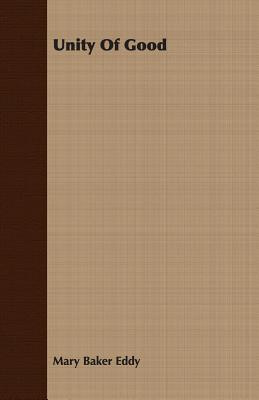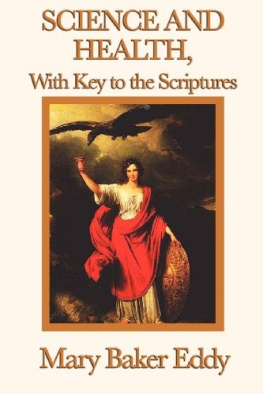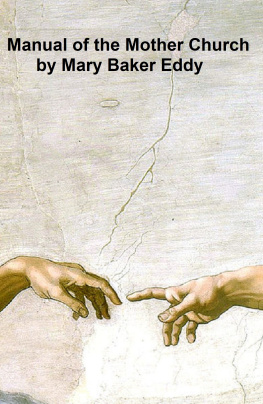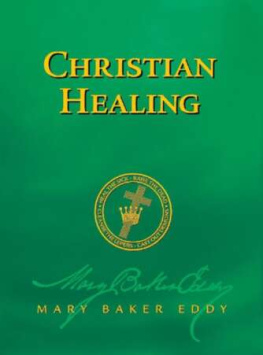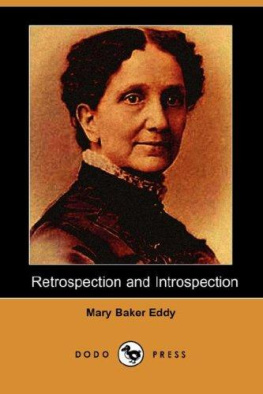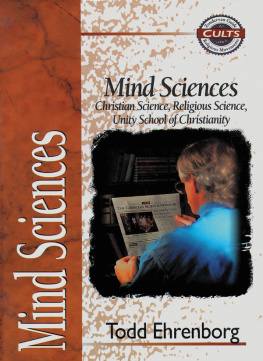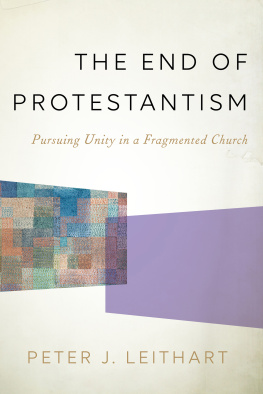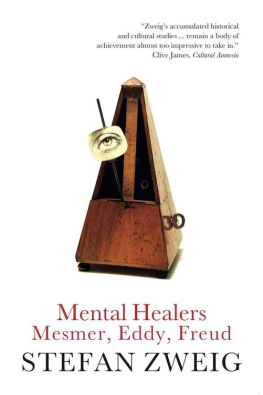The Project Gutenberg EBook of Unity of Good, by Mary Baker Eddy
This eBook is for the use of anyone anywhere at no cost and with
almost no restrictions whatsoever. You may copy it, give it away or
re-use it under the terms of the Project Gutenberg License included
with this eBook or online at www.gutenberg.org
Title: Unity of Good
Author: Mary Baker Eddy
Release Date: August 25, 2005 [EBook #16591]
Language: English
*** START OF THIS PROJECT GUTENBERG EBOOK UNITY OF GOOD ***
Produced by Justin Gillbank, Josephine Paolucci and the
Online Distributed Proofreading Team at https://www.pgdp.net
UNITY OF GOOD
BY
MARY BAKER EDDY
AUTHOR OF SCIENCE AND HEALTH WITH KEY TO THE SCRIPTURES
Registered U.S. Patent Office
Published by The Trustees under the Will of Mary Baker G. Eddy
BOSTON, U.S.A.
Authorized Literature of
The First Church of Christ, Scientist
in Boston, Massachusetts
Copyright, 1887, 1891, 1908
By Mary Baker G. Eddy
Copyright renewed, 1915
Copyright renewed, 1919
All rights reserved
PRINTED IN THE UNITED STATES OF AMERICA
Contents
| Caution in the Truth |
| Does God know or behold sin, sickness, and death? |
| Seedtime and Harvest |
| Is anything real of which the physical senses are cognizant? |
| The Deep Things of God |
| Ways Higher than Our Ways |
| Rectifications |
| A Colloquy |
| The Ego |
| Soul |
| There is no Matter |
| Sight |
| Touch |
| Taste |
| Force |
| Is There no Death? |
| Personal Statements |
| Credo |
| Do you believe in God? |
| Do you believe in man? |
| Do you believe in matter? |
| What say you of woman? |
| What say you of evil? |
| Suffering from Others' Thoughts |
| The Saviour's Mission |
| Summary |
Unity of Good
Caution in the Truth
Perhaps no doctrine of Christian Science rouses so much natural doubt and questioning as this, that God knows no such thing as sin. Indeed, this may be set down as one of the "things hard to be understood," such as the apostle Peter declared were taught by his fellow-apostle Paul, "which they that are unlearned and unstable wrest ... unto their own destruction." (2 Peter iii. 16.)
Let us then reason together on this important subject, whose statement in Christian Science may justly be characterized as wonderful.
Does God know or behold sin, sickness, and death?
The nature and character of God is so little apprehended and demonstrated by mortals, that I counsel my students to defer this infinite inquiry, in their discussions of Christian Science. In fact, they had better leave the subject untouched, until they draw nearer to the divine character, and are practically able to testify, by their lives, that as they come closer to the true understanding of God they lose all sense of error.
The Scriptures declare that God is too pure to behold iniquity (Habakkuk i. 13); but they also declare that God pitieth them who fear Him; that there is no place where His voice is not heard; that He is "a very present help in trouble."
The sinner has no refuge from sin, except in God, who is his salvation. We must, however, realize God's presence, power, and love, in order to be saved from sin. This realization takes away man's fondness for sin and his pleasure in it; and, lastly, it removes the pain which accrues to him from it. Then follows this, as the finale in Science: The sinner loses his sense of sin, and gains a higher sense of God, in whom there is no sin.
The true man, really saved, is ready to testify of God in the infinite penetration of Truth, and can affirm that the Mind which is good, or God, has no knowledge of sin.
In the same manner the sick lose their sense of sickness, and gain that spiritual sense of harmony which contains neither discord nor disease.
According to this same rule, in divine Science, the dyingif they die in the Lordawake from a sense of death to a sense of Life in Christ, with a knowledge of Truth and Love beyond what they possessed before; because their lives have grown so far toward the stature of manhood in Christ Jesus, that they are ready for a spiritual transfiguration, through their affections and understanding.
Those who reach this transition, called death, without having rightly improved the lessons of this primary school of mortal existence,and still believe in matter's reality, pleasure, and pain,are not ready to understand immortality. Hence they awake only to another sphere of experience, and must pass through another probationary state before it can be truly said of them: "Blessed are the dead which die in the Lord."
They upon whom the second death, of which we read in the Apocalypse (Revelation xx. 6), hath no power, are those who have obeyed God's commands, and have washed their robes white through the sufferings of the flesh and the triumphs of Spirit. Thus they have reached the goal in divine Science, by knowing Him in whom they have believed. This knowledge is not the forbidden fruit of sin, sickness, and death, but it is the fruit which grows on the "tree of life." This is the understanding of God, whereby man is found in the image and likeness of good, not of evil; of health, not of sickness; of Life, not of death.
God is All-in-all. Hence He is in Himself only, in His own nature and character, and is perfect being, or consciousness. He is all the Life and Mind there is or can be. Within Himself is every embodiment of Life and Mind.
If He is All, He can have no consciousness of anything unlike Himself; because, if He is omnipresent, there can be nothing outside of Himself.
Now this self-same God is our helper. He pities us. He has mercy upon us, and guides every event of our careers. He is near to them who adore Him. To understand Him, without a single taint of our mortal, finite sense of sin, sickness, or death, is to approach Him and become like Him.
Truth is God, and in God's law. This law declares that Truth is All, and there is no error. This law of Truth destroys every phase of error. To gain a temporary consciousness of God's law is to feel, in a certain finite human sense, that God comes to us and pities us; but the attainment of the understanding of His presence, through the Science of God, destroys our sense of imperfection, or of His absence, through a diviner sense that God is all true consciousness; and this convinces us that, as we get still nearer Him, we must forever lose our own consciousness of error.
But how could we lose all consciousness of error, if God be conscious of it? God has not forbidden man to know Him; on the contrary, the Father bids man have the same Mind "which was also in Christ Jesus,"which was certainly the divine Mind; but God does forbid man's acquaintance with evil. Why? Because evil is no part of the divine knowledge.
John's Gospel declares (xvii. 3) that "life eternal" consists in the knowledge of the only true God, and of Jesus Christ, whom He has sent. Surely from such an understanding of Science, such knowing, the vision of sin is wholly excluded.
Nevertheless, at the present crude hour, no wise men or women will rudely or prematurely agitate a theme involving the All of infinity.
Rather will they rejoice in the small understanding they have already gained of the wholeness of Deity, and work gradually and gently up toward the perfect thought divine. This meekness will increase their apprehension of God, because their mental struggles and pride of opinion will proportionately diminish.

